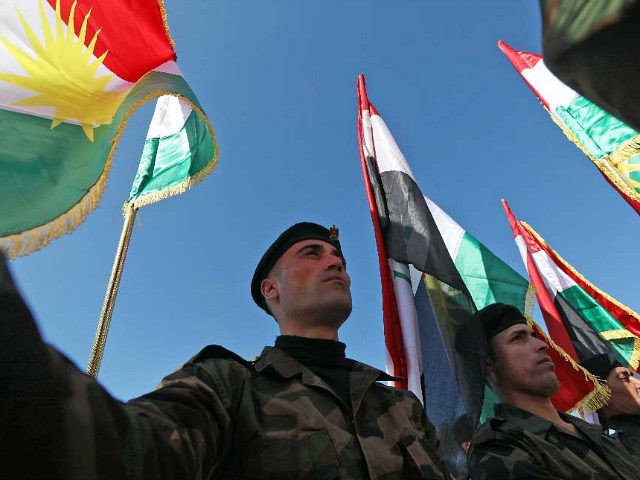The Iraqi security troops rekindled their relationship with the Kurdish Peshmerga forces this week as Iraq faces an Islamic State (ISIS/ISIL) resurgence.
Kurdistan 24 reports that “cooperation between the Kurdish Peshmerga and Iraqi Security Forces (ISF) is being renewed,” adding:
The US-led Coalition (CJTF-OIR) is urging the formation of a Joint Task Force between the Peshmerga and Iraqi forces, an informed Kurdish source told Kurdistan 24, corroborating recent reports in the Kurdish and Iraqi press.
The animosity associated with Baghdad’s attack on Kirkuk last October appears to be giving way to a pragmatic recognition that cooperation is necessary to prevent a common foe from returning.
Kurdistan 24 learned from an unnamed source that “meetings on security cooperation, with US officers in attendance, have been held between the Peshmerga and ISF.”
Iraqi Kurdistan Prime Minister Nechirvan Barzani recently expressed the semi-autonomous Kurdish Regional Government’s (KRG) “readiness to cooperate and coordinate” with the U.S.-led coalition, especially “where the threat of terrorism remains.”
The PM “stressed the need for cooperation” between the KRG and its Iraqi counterparts, as well as with “international partners to restore stability” and address the “political, economic, and administrative” failures that strengthen jihadist groups.
His comments came last week when top officials from Baghdad and the coalition met with KRG leaders.
“Continued pressure from security forces—both ISF and Peshmerga—is necessary to prevent an [IS] resurgence,” American Col. Ryan Dillon, a U.S.-led coalition spokesman, told Kurdistan 24.
“Iraqi security forces and Peshmerga have proven they can overwhelm [IS] when they cooperate together and share information,” Dillon added, refusing to explicitly confirm that the United States is pushing for renewed security coordination between the two.
Baghdad has acknowledged that it is repairing its relations with the KRG.
“We are creating security cells under the leadership of the federal government’s Counter Terrorism Forces with the participation of security forces from the Kurdistan Region to fill the security vacuum,” Iraqi Prime Minister Haider al-Abadi explained on March 27.
In October 2017, the KRG in northern Iraq overwhelmingly voted in favor of independence from Baghdad, prompting opposition from the Iraqi government, the United States, and many other countries.
The move strained the historical relationship between the U.S. and the Iraqi Kurds while also drawing the ire of neighboring Iran and Turkey.
Baghdad-sanctioned Shiite militias linked to Iran have expressed disdain towards efforts to get the Peshmerga and Iraqi troops back together. Nevertheless, the lingering ISIS threat in Iraq has apparently driven the KRG to join Baghdad again.
On Tuesday, Bayan Sami Abdul Rahman, the KRG representative said the Iraqi Kurds also require the assistance of the U.S. to keep fighting ISIS.
“We need you to stay the course in Iraq and help our society to recover from the most recent trauma that we faced,” Rahman declared during a panel discussion hosted by the U.S. Institute of Peace (USIP) on Tuesday, addressing the Trump administration.
Although the U.S.-led coalition and local troops have retaken nearly all of the territory in Iraq and Syria once held by ISIS, Gen. Joseph Votel, the top American commander in the Middle East, noted during the same event that the group remains a menace to stability in the region.
The top American general stressed that ISIS still maintains a presence in the region.
“ISIS’s proto-state no longer exists. Their flag doesn’t fly over Iraqi territory,” Fareed Yasseen, the Iraqi ambassador to the United States, told Foreign Policy (FP). “But that doesn’t mean they’ve disappeared. They are reverting to old tactics used by al Qaeda before 2014.”
“We still have fragments of ISIS or remnants of ISIS — mainly the Makhmur, Kirkuk, Tuz Khurmatu area — there’s a sort of a diagonal line there where we find fragments of ISIS,” U.S. Brig. Gen. Andrew Croft told reporters last week.
Citing an unnamed senior Iraqi official on Tuesday, Sarhang Hamasaeed, the director of the Middle East Programs at the U.S. Institute for Peace, indicated that tens of thousands of ISIS members remain in Iraq alone.
He said that Shiite-led Baghdad has issued warrants (90,000) or arrested (36,000) about 126,000 individuals accused of having links or belonging to the Sunni terrorist group ISIS, stressing that not all of the suspected members are linked to the jihadists group.
“That is a big number of people that the Iraqi justice system or security system will have to deal with. … That is a challenge that will threaten [stability],” the USIP expert proclaimed.

COMMENTS
Please let us know if you're having issues with commenting.